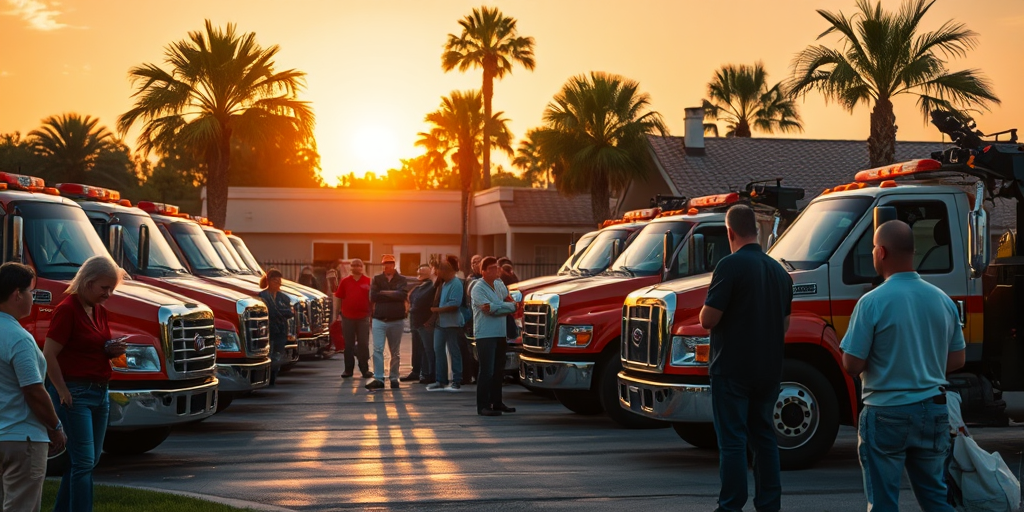Tow Truck Community Honors Fallen Colleague in Harlingen
On a solemn Saturday in Harlingen, a vibrant procession of tow trucks lined up along the road leading to Highland Memorial Park Cemetery. The gathering of dozens of tow truck drivers and community members from across the Rio Grande Valley was a poignant tribute to David Zapata, a fellow driver who tragically lost his life in a crash caused by a drunk driver earlier this week. The collective show of support underscored the close-knit nature and resilience of the Valley’s towing community.
The Tragic Incident
David Zapata, a dedicated tow truck driver, was struck and killed while on duty by an alleged drunk driver as he was working on the expressway in Harlingen. His untimely death has deeply resonated across the RGV, highlighting the inherent risks faced by roadside assistance workers. Hugo Salinas, a tow truck supervisor at Stealth Auto Recovery, helped organize the procession and voiced the sentiments of many. “This really just hits home because it really could’ve been any one of us,” Salinas remarked, encapsulating the shared vulnerability felt by him and his colleagues.
Community and Legislative Support
The loss of Zapata has reignited conversations around the Texas Move Over Slow Down law, which mandates drivers to change lanes or reduce their speed by 20 miles per hour below the limit when approaching emergency or tow vehicles on the road. Failing to comply with this law can result in fines and possible jail time. Salinas stressed the importance of public adherence to this law, saying, “We just want the public to just please respect the tow trucks like they are a police vehicle or emergency response vehicle, so this won’t happen again.”
While the RGV community comes together in mourning, there is a consensus on the need to build greater awareness and enforcement of traffic safety laws to prevent similar tragedies. Local officials are now considering steps to bolster these laws through road signage and community education programs.
Reflections from the Community
As the funeral procession made its way to Zapata’s final resting place in Weslaco, numerous community members shared their reflections on his life and the broader implications of his passing. “We all have families to go back to, and this just makes my heart heavy,” shared Maria Gomez, a fellow tow truck driver. “David’s passing is a reminder of how important it is for everyone on the road to look out for us.”
Residents from different cities within the Valley attended the memorial, demonstrating the solidarity and camaraderie that define the region. In the words of Raul Cervantes, a Harlingen resident, “This could’ve been my brother or my cousin. It shows how interconnected we all are, and we need to take care of each other, especially when lives are at stake.”
Continuing the Conversation
The dialogue sparked by Zapata’s death is part of an ongoing effort to improve roadside safety not just within the RGV, but across South Texas. The Valley has seen its share of fatal roadside accidents in recent years, prompting discussion on additional protective measures for workers.
Looking ahead, the community plans to hold pedestrian and driver safety workshops to better educate the public about existing laws and the critical importance of adhering to them. Moreover, the potential for more stringent penalties for violators is under exploration by local policymakers.
Empowering Change through Community Action
The tragedy of David Zapata’s death has empowered a movement among Valley residents to push for a safer working environment for all roadside workers. In addition to community workshops, collaborations with local schools and organizations are being discussed to incorporate awareness into educational curriculums.
For those looking to get involved or learn more about local traffic laws, resources are available through various RGV platforms. Organizations are encouraging participation in local advocacy groups focusing on driving and safety regulations in the Valley.
In summary, while the ordeal of David Zapata’s passing is a sorrowful chapter for the Rio Grande Valley, it also lays the groundwork for meaningful change. The desire for increased awareness and community-driven initiatives resonates strongly across the RGV, showing that the legacy of those lost on the job can drive impactful, lifesaving reforms.







